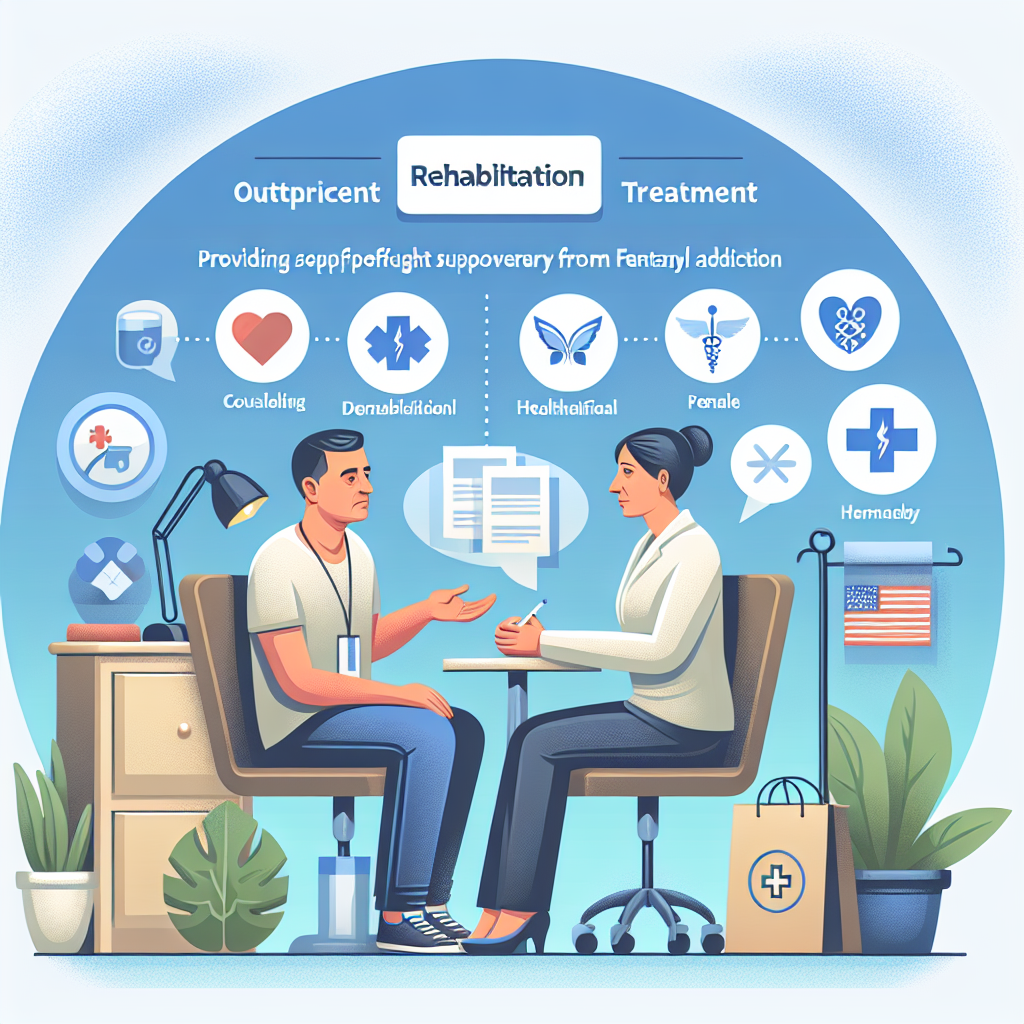-
Table of Contents

“Outpatient Treatment: Empowering Fentanyl Addiction Recovery with Flexibility and Support.”
Introduction
Outpatient treatment can provide sufficient support for fentanyl addiction recovery by offering a structured yet flexible approach that allows individuals to maintain their daily responsibilities while receiving comprehensive care. This type of treatment typically includes a combination of medical supervision, counseling, behavioral therapies, and support groups, all tailored to address the unique challenges of fentanyl addiction. By integrating these elements, outpatient programs aim to help individuals develop coping strategies, manage withdrawal symptoms, and build a strong foundation for long-term recovery, all within a less restrictive environment compared to inpatient treatment.
Evaluating the Effectiveness of Outpatient Treatment for Fentanyl Addiction Recovery
Outpatient treatment programs have emerged as a viable option for individuals seeking recovery from fentanyl addiction, offering a flexible and less intrusive alternative to inpatient care. These programs allow patients to maintain their daily responsibilities, such as work and family commitments, while receiving the necessary support to overcome their addiction. However, the question remains: can outpatient treatment provide sufficient support for fentanyl addiction recovery?
To begin with, it is essential to understand the nature of fentanyl addiction. Fentanyl, a potent synthetic opioid, is significantly more powerful than morphine and heroin. Its high potency makes it particularly dangerous and challenging to overcome. The withdrawal symptoms associated with fentanyl can be severe, including intense cravings, anxiety, depression, and physical discomfort. Given these challenges, the effectiveness of outpatient treatment hinges on several critical factors.
One of the primary advantages of outpatient treatment is its accessibility. Patients can receive care without the need to uproot their lives, making it a more feasible option for many. This accessibility can be particularly beneficial for those who have strong support systems at home. Family and friends can play a crucial role in the recovery process, providing emotional support and encouragement. Moreover, outpatient programs often incorporate family therapy sessions, which can help mend relationships strained by addiction and foster a supportive home environment.
Another significant benefit of outpatient treatment is the ability to apply coping strategies in real-time. Patients can immediately implement the skills and techniques they learn in therapy sessions into their daily lives. This real-world application can reinforce positive behaviors and help individuals navigate triggers and stressors as they arise. Additionally, outpatient programs typically offer a range of therapeutic approaches, including cognitive-behavioral therapy (CBT), motivational interviewing, and contingency management, all of which have been shown to be effective in treating substance use disorders.
However, the success of outpatient treatment is not guaranteed and depends on the individual’s commitment and the program’s quality. A comprehensive outpatient program should include medical supervision, particularly during the initial stages of withdrawal. Medications such as buprenorphine or methadone can be prescribed to manage withdrawal symptoms and reduce cravings, making the recovery process more manageable. Regular monitoring and adjustments to the treatment plan are crucial to address any emerging issues promptly.
Peer support is another vital component of outpatient treatment. Group therapy sessions and support groups, such as Narcotics Anonymous (NA), provide a sense of community and shared experience. These groups offer a platform for individuals to share their struggles and successes, fostering a sense of belonging and reducing feelings of isolation. The encouragement and accountability from peers can be a powerful motivator in maintaining sobriety.
While outpatient treatment offers numerous benefits, it may not be suitable for everyone. Individuals with severe addiction or co-occurring mental health disorders may require the intensive support and structure provided by inpatient programs. In such cases, a combination of inpatient and outpatient care might be the most effective approach, allowing for a seamless transition from intensive treatment to ongoing support.
In conclusion, outpatient treatment can provide sufficient support for fentanyl addiction recovery, particularly for those with a strong support system and a high level of commitment to their recovery journey. The flexibility, accessibility, and real-world application of coping strategies make outpatient programs a valuable option. However, the success of these programs depends on the individual’s unique circumstances and the quality of care provided. With the right combination of medical supervision, therapeutic approaches, and peer support, outpatient treatment can be a powerful tool in overcoming fentanyl addiction and achieving lasting recovery.
Key Benefits and Challenges of Outpatient Programs in Fentanyl Addiction Recovery
Outpatient treatment programs have emerged as a viable option for individuals seeking recovery from fentanyl addiction, offering a blend of flexibility and support that can be particularly appealing. These programs allow patients to maintain their daily responsibilities, such as work, school, and family commitments, while receiving the necessary care to overcome their addiction. However, the effectiveness of outpatient treatment for fentanyl addiction hinges on several key factors, including the level of support provided, the structure of the program, and the individual’s commitment to recovery.
One of the primary benefits of outpatient treatment is its ability to integrate recovery into the patient’s everyday life. This approach can be especially beneficial for those who have strong support systems at home and in their communities. By remaining in their familiar environments, patients can apply the coping strategies and skills they learn in treatment directly to real-life situations. This immediate application can reinforce positive behaviors and help individuals build resilience against triggers and cravings.
Moreover, outpatient programs often offer a range of therapeutic modalities, including individual counseling, group therapy, and medication-assisted treatment (MAT). These diverse options allow for a more personalized approach to recovery, addressing the unique needs and challenges of each patient. For instance, MAT can be particularly effective for fentanyl addiction, as it helps to manage withdrawal symptoms and reduce cravings, making it easier for patients to focus on their recovery journey.
Despite these advantages, outpatient treatment also presents certain challenges that must be carefully considered. One significant concern is the potential for exposure to triggers and high-risk situations. Unlike inpatient programs, where patients are in a controlled environment, outpatient participants must navigate their recovery amidst the same stressors and temptations that may have contributed to their addiction. This reality underscores the importance of a robust support network and a strong commitment to the treatment plan.
Additionally, the success of outpatient treatment often depends on the patient’s level of motivation and engagement. Recovery from fentanyl addiction is a demanding process that requires consistent effort and dedication. Patients must be willing to attend regular therapy sessions, adhere to medication regimens, and actively participate in support groups. Without this level of commitment, the risk of relapse can increase significantly.
Another challenge is the potential for limited access to comprehensive care. While many outpatient programs offer a wide range of services, some may lack the resources to provide the intensive support needed for severe cases of fentanyl addiction. In such instances, a combination of outpatient and inpatient care might be necessary to ensure a more holistic approach to recovery.
Nevertheless, the inspirational stories of individuals who have successfully overcome fentanyl addiction through outpatient treatment highlight the potential of these programs. With the right support, structure, and personal determination, outpatient treatment can indeed provide sufficient support for recovery. It is crucial for patients to work closely with their healthcare providers to develop a tailored treatment plan that addresses their specific needs and circumstances.
In conclusion, while outpatient treatment for fentanyl addiction presents both benefits and challenges, its success largely depends on the individual’s commitment and the quality of the program. By leveraging the flexibility and support offered by outpatient care, many individuals can achieve lasting recovery and reclaim their lives from the grip of addiction.
Q&A
1. **Question:** Can outpatient treatment provide sufficient support for fentanyl addiction recovery?
**Answer:** Yes, outpatient treatment can provide sufficient support for fentanyl addiction recovery, especially when combined with medication-assisted treatment (MAT), counseling, and support groups.
2. **Question:** What factors influence the effectiveness of outpatient treatment for fentanyl addiction?
**Answer:** The effectiveness of outpatient treatment for fentanyl addiction is influenced by factors such as the severity of the addiction, the presence of co-occurring mental health disorders, the individual’s support system, and their commitment to the treatment plan.
Conclusion
Outpatient treatment can provide sufficient support for fentanyl addiction recovery for certain individuals, particularly those with a stable home environment, strong social support, and a lower severity of addiction. It offers flexibility, allowing patients to maintain daily responsibilities while receiving therapy, medication-assisted treatment, and other support services. However, the success of outpatient treatment largely depends on the individual’s commitment, the quality of the program, and the presence of a robust support system. For those with severe addiction or co-occurring disorders, inpatient treatment may be more appropriate. Therefore, while outpatient treatment can be effective, it is not universally suitable for all cases of fentanyl addiction.



